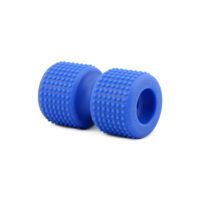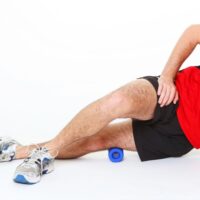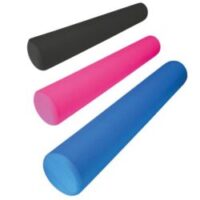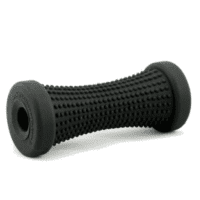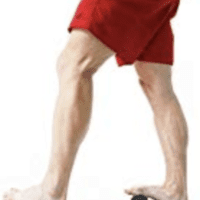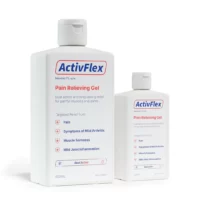Trigger Point Therapy

Trigger Point Therapy
A Guide to Trigger Point Pain Relief
Introduction
Trigger Point Therapy, a specialised form of Remedial Massage Therapy, has gained recognition for its effectiveness in alleviating muscle tension and pain. This therapy, pivotal in physiotherapy practice, offers a non-invasive solution to chronic and acute pain conditions.
What is Trigger Point Therapy?
Trigger Point Therapy involves applying direct pressure to specific points on tender muscle tissue. These points, known as trigger points, are often the source of muscle pain and discomfort.
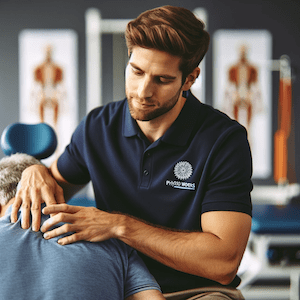
Activating Trigger Points
Trigger points in muscles can be activated by various factors, including overuse, trauma, electrolyte imbalances, infections, and nerve pain. These points can cause direct pain or refer pain to other body areas, making diagnosis and treatment a specialised skill.
Benefits of Trigger Point Therapy
Trigger Point Therapy is suitable for almost everyone. Muscles with active trigger points tend to be weaker and restricted in movement. Addressing these points can restore strength and flexibility, often relieving pain that other treatments have failed to alleviate.
Who Performs Trigger Point Therapy?
Qualified physiotherapists or remedial massage therapists, trained in soft tissue therapies, conduct Trigger Point Therapy. They possess in-depth knowledge of muscle anatomy and are skilled in identifying and treating trigger points.
Treatment Frequency
The number of treatments varies based on the individual’s condition. Acute injuries might require fewer sessions, while chronic conditions could need a more extended treatment plan.
Combining with Modern Medicine
Trigger Point Therapy complements other medical treatments and therapies. It’s often combined with physiotherapy, massage, and other modalities for enhanced recovery.
Dry Needling for Trigger Points
An increasingly popular complement to Trigger Point Therapy is Dry Needling, a technique often used by physiotherapists to effectively treat muscle knots and trigger points. Unlike traditional acupuncture, Dry Needling specifically targets muscular trigger points. By inserting a fine needle into the affected muscle, the physiotherapist can stimulate the trigger point, promoting relaxation and pain relief. This method is particularly beneficial for deep muscles that are difficult to reach with manual massage techniques.
Research suggests that Dry Needling can provide immediate relief from muscular pain and stiffness, enhance range of motion, and aid in the overall recovery process. It’s a safe and efficient technique that, when performed by a trained physiotherapist, can be a powerful tool in managing musculoskeletal pain and enhancing muscle function.
Read more: Dry Needling
Effectiveness in Various Conditions
This therapy is particularly effective for conditions like back pain, neck pain, shoulder pain, knee pain, sciatica, headaches, muscle pain, and joint pain. It’s especially beneficial for chronic pain patterns that are difficult to reverse with conventional treatments.
Recent Research Insights
Recent studies indicate that Trigger Point Therapy not only offers immediate pain relief but also contributes to long-term healing by breaking chronic pain cycles. This therapy is increasingly recommended as part of holistic pain management programs.
Conclusion
Trigger Point Therapy stands out as a highly effective, non-invasive treatment option for a range of musculoskeletal conditions. With its ability to target and alleviate pain at its source, it’s a valuable tool in a physiotherapist’s repertoire.
What to Do?
If you’re experiencing persistent muscle or joint pain, consulting a physiotherapist skilled in Trigger Point Therapy is advisable. They can provide a tailored treatment plan suited to your specific needs.
Related Articles
For more information on related topics, visit PhysioWorks:
Massage Therapists
Massage FAQs
Your Ultimate Guide to Massage Therapy and Muscle Injury Recovery
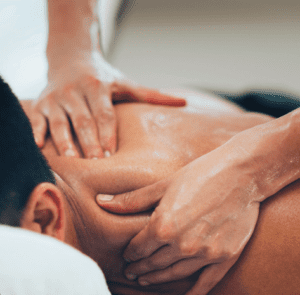

Introduction
Welcome to our comprehensive FAQ page on massage therapy and muscle injury recovery. Whether you're seeking relaxation, recovering from an injury, or enhancing your athletic performance, our guide covers everything you need to know about the benefits, techniques, and styles of massage therapy. Explore the various conditions that massage can treat and discover the best practices for your health and well-being.
What Conditions Can Massage Therapy Help?
Massage therapy can address a variety of conditions, including chronic pain, stress, and muscle injuries. It improves blood circulation, reduces muscle tension, and promotes relaxation.
- Chronic Pain Relief: Learn how massage therapy can alleviate chronic pain and improve your quality of life.
- Stress Reduction: Discover the calming effects of massage and how it helps reduce stress and anxiety.
- Injury Recovery: Find out how massage aids in the recovery of various injuries.
What are the Benefits of Getting a Massage?
Regular massage sessions offer numerous benefits, from physical to mental well-being. They help in muscle relaxation, improved circulation, and stress relief.
- Physical Benefits: Explore how massage therapy enhances physical health.
- Mental Well-being: Understand the mental health benefits of regular massages.
- Boosted Immunity: Learn about the surprising ways massage can boost your immune system.
Read more: The Benefits of Massage
What Are The Best Massage Techniques?
Different massage techniques cater to various needs, from relaxation to injury recovery. Knowing the right technique can enhance the effectiveness of your treatment.
- Swedish Massage: Ideal for relaxation and stress relief.
- Deep Tissue Massage: Best for treating muscle injuries and chronic pain.
- Trigger Point Therapy: Effective for relieving muscle knots and tension.
PhysioWorks Massage - Money Back Guarantee!
We are confident in our services and offer a money-back guarantee if you're not satisfied. Learn more about our commitment to your satisfaction.
PhysioWorks Massage Money Back Guarantee
Massage Styles
Understanding the different styles of massage can help you choose the right one for your needs. Each style offers unique benefits.
- Remedial Massage: Focuses on treating specific injuries and conditions.
- Relaxation Massage: Perfect for unwinding and reducing stress.
- Acupressure: Utilises pressure points to relieve pain and tension.
Sports Massage
Athletes can greatly benefit from sports massages, which prepare the body for activity and aid in recovery post-event.
- Pre-Event Massage: Helps in preparing muscles for intense activity.
- Post-Event Massage: Assists in muscle recovery and reduces soreness.
Massage Gift Vouchers
Gift a loved one the benefit of relaxation and healing with our massage gift vouchers. They make for a thoughtful and health-promoting present. Purchase Here
Common Muscle Injury FAQs
Diagnostic
Understanding your muscle injury is the first step towards effective treatment. Learn how to identify and diagnose common muscle injuries.
- Identifying Muscle Injuries: Symptoms and signs to watch out for.
- Types of Muscle Injuries: Different muscle injuries explained.
- Trigger Points: What they are and how they affect muscles.
Treatment & Recovery
Effective treatments and recovery strategies are crucial for healing muscle injuries and preventing future issues.
- Early Muscle Injury Treatment: Immediate steps to take for best results.
- Speeding Up Recovery: Tips and techniques for faster muscle recovery.
- Dry Needling: How it helps in muscle injury recovery.
Conclusion
Massage therapy offers a range of benefits, from stress relief to injury recovery. By understanding the various techniques and styles, you can make an informed decision about your treatment. Explore our related articles to learn more about how massage can improve your health and well-being.
Massage FAQs
1. What are the benefits of massage therapy? Massage therapy can reduce muscle tension, improve circulation, and relieve stress, among other benefits.
2. How does massage help muscle injuries? Massage promotes healing by increasing blood flow to the injured area and reducing inflammation.
3. What is the difference between remedial and relaxation massage? Remedial massage targets specific injuries and pain points, while relaxation massage focuses on overall relaxation and stress relief.
4. When is the best time for a sports massage? For athletes, the best time for a sports massage is before an event to prepare muscles and after an event to aid recovery.
5. How can I purchase a massage gift voucher? Massage gift vouchers can be purchased online or in person at our clinic. They make a great gift for loved ones.
6. What should I expect during a massage session? During a massage session, you can expect to discuss your needs with the therapist, who will then use various techniques to address your concerns and promote relaxation.
Related Articles:
- Chronic Pain Relief: Discover effective massage techniques for chronic pain.
- Stress Reduction: Learn how massage therapy can reduce stress and improve mental health.
- Injury Recovery: Find out how massage aids in the recovery of various injuries.
- Swedish Massage: Ideal for relaxation and stress relief.
- Deep Tissue Massage: Best for treating muscle injuries and chronic pain.
- Trigger Point Therapy: Effective for relieving muscle knots and tension.
- Remedial Massage: Focuses on treating specific injuries and conditions.
- Relaxation Massage: Perfect for unwinding and reducing stress.
- Pre-Event Sports Massage: Helps in preparing muscles for intense activity.
- Post-Event Sports Massage: Assists in muscle recovery and reduces soreness.







